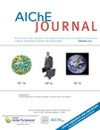
AICHE JOURNAL
Scope & Guideline
Unveiling Breakthroughs in Chemical and Environmental Sciences
Introduction
Aims and Scopes
- Chemical Process Engineering:
Focuses on the design, optimization, and control of chemical processes, emphasizing energy efficiency and sustainability. This includes studies on reaction kinetics, thermodynamics, and process intensification. - Material Science and Engineering:
Covers the development and application of novel materials, including polymers, catalysts, and nanomaterials, particularly in relation to their role in chemical processes and energy conversion. - Fluid Dynamics and Transport Phenomena:
Investigates the behavior of fluids in various systems, including microfluidics, multiphase flow, and mass transfer, with applications in reactor design and separation processes. - Process Systems Engineering:
Involves modeling, simulation, and optimization of complex chemical processes using advanced computational techniques, including machine learning and data-driven approaches. - Sustainable and Green Engineering:
Addresses the integration of renewable resources, waste minimization, and carbon capture technologies, focusing on the development of sustainable chemical processes. - Bioengineering and Biotechnology:
Explores the application of chemical engineering principles in biological systems, including the design of bioprocesses for pharmaceuticals and biofuels.
Trending and Emerging
- Machine Learning and Data-Driven Approaches:
There is a significant increase in research utilizing machine learning and artificial intelligence for process optimization, predictive modeling, and materials discovery, indicating a trend towards integrating computational tools in chemical engineering. - Electrochemical Processes and Energy Storage:
Research on electrochemical systems, including batteries, fuel cells, and CO2 reduction technologies, is gaining momentum as the demand for sustainable energy solutions rises. - Advanced Materials for Separation and Catalysis:
Emerging studies focus on the development of novel materials, such as metal-organic frameworks (MOFs) and nanostructured catalysts, which promise enhanced performance in separation processes and catalytic reactions. - Sustainable Chemical Processes:
There is a growing emphasis on research that promotes sustainability, including studies on green chemistry, waste valorization, and integrated bioprocessing for biofuels and bioproducts. - Microfluidics and Nanoscale Engineering:
The exploration of microfluidics and nanoscale processes is trending, providing new insights into reaction dynamics and material synthesis at smaller scales.
Declining or Waning
- Traditional Separation Processes:
Research focusing on conventional separation methods, such as distillation and extraction, has diminished as newer technologies like membrane separations and advanced adsorption techniques gain traction. - Basic Chemical Reaction Mechanisms:
There has been a noticeable decrease in studies centered solely on fundamental reaction mechanisms, as the field shifts towards more application-driven research that integrates mechanistic insights with practical applications. - Conventional Energy Systems:
With the growing emphasis on renewable energy and sustainability, traditional fossil fuel-based energy systems are receiving less attention compared to innovative approaches like bioenergy and electrochemical energy storage.
Similar Journals

Engineering Review
Pioneering pathways for engineering excellence.Engineering Review is a prominent academic journal published by the University of Rijeka, Faculty of Engineering in Croatia. As an emerging outlet in the field of engineering, the journal has been providing a platform for interdisciplinary research since its inception in 2011, with a commitment to disseminating high-quality studies up to the horizon of 2024. Although currently categorized as Q4 in the Engineering (miscellaneous) section and ranking 242 out of 307 in General Engineering per Scopus metrics, the journal aims to bolster its impact and reach within the engineering community. With a focus on innovative approaches and practical applications in various engineering disciplines, Engineering Review invites contributions from researchers, professionals, and students alike, fostering a collaborative environment for the advancement of engineering research in a global context. While it is not an open-access journal at this time, it remains a vital resource for those engaged in cutting-edge engineering endeavors.
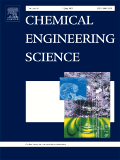
CHEMICAL ENGINEERING SCIENCE
Exploring the Nexus of Theory and Practice in EngineeringChemical Engineering Science is an esteemed journal published by Pergamon-Elsevier Science Ltd, dedicated to advancing the field of chemical engineering through high-quality research and innovation. With a storied history spanning from 1951 to 2025, this journal is recognized as a leading platform for disseminating cutting-edge studies, encompassing a diverse range of topics within chemical engineering, applied mathematics, and industrial engineering. Notably, it holds a prestigious Q1 ranking in several categories, including Chemical Engineering and Industrial and Manufacturing Engineering, indicating its significant impact and influence in these fields. The journal is not open access, yet it maintains a robust readership and is widely cited in academic circles, reflecting its vital role in shaping modern engineering practices. As a vital resource for researchers, professionals, and students alike, Chemical Engineering Science continues to bridge theoretical concepts and practical applications, fostering a deeper understanding of the complex challenges in chemical processes and manufacturing.
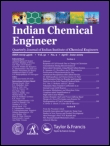
Indian Chemical Engineer
Elevating Standards in Chemical Engineering Research.Indian Chemical Engineer, published by Taylor & Francis Ltd, stands as a reputable journal in the field of chemical engineering, encompassing a wide range of topics pertinent to both academia and industry. With an ISSN of 0019-4506 and an E-ISSN of 0975-007X, this journal has been a key resource for researchers and professionals since its inception in 1992, undergoing a significant evolution from 2009 to 2024. Currently ranked in the Q3 category of chemical engineering (miscellaneous) in 2023, it reflects a dedicated commitment to disseminating innovative research and insights within the discipline. The journal is indexed in Scopus, achieving a rank of 148 out of 273, which denotes its growing influence in the field with a 45th percentile placement. Although currently not an open-access publication, it offers valuable content that contributes extensively to the advancement of chemical engineering research and education. Researchers, professionals, and students alike are encouraged to engage with this publication to stay at the forefront of industry advancements and academic discussions.

KAGAKU KOGAKU RONBUNSHU
Exploring Interdisciplinary Innovations in Chemical SciencesKAGAKU KOGAKU RONBUNSHU is a distinguished journal published by the SOC CHEMICAL ENG JAPAN, focusing on the interdisciplinary realms of chemical engineering and chemistry since its inception in 1975. With a commitment to advancing knowledge in these fields, the journal has established itself as a critical forum for researchers, professionals, and students alike, contributing to the understanding and application of chemical processes and materials sciences. Although it operates under a traditional publication model, the journal garners attention within the academic community, reflected in its Q3 rankings in both Chemical Engineering and Chemistry categories as of 2023. With the journal's ISSN 0386-216X and a comprehensive coverage spanning nearly five decades, it remains an essential resource for contemporary chemical research and developments, addressing ongoing challenges and innovative solutions in various applications. The journal invites submissions that reflect the latest advancements and insights in these fields, striving to foster a vibrant academic dialogue and support future innovations.
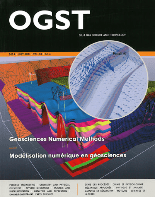
Oil & Gas Science and Technology-Revue d IFP Energies nouvelles
Pioneering Solutions for a Sustainable FutureOil & Gas Science and Technology - Revue d'IFP Energies nouvelles, published by EDP SCIENCES S A, is a distinguished journal in the field of energy science, specifically focusing on the latest advancements in oil and gas technologies. Since its transition to Open Access in 1997, the journal has been dedicated to disseminating high-quality research that addresses the challenges and innovations inherent in energy engineering and fuels. With an ISSN of 1294-4475 and an E-ISSN of 1953-8189, this journal holds a significant position in academic circles, reflecting its contributions to sustainable energy solutions. The journal's rankings in Scopus showcase its impact, particularly in the areas of Energy Engineering and Power Technology (Rank #105/224), Chemical Engineering (Rank #131/279), and Fuel Technology (Rank #51/100). As a pivotal resource for researchers, professionals, and students, it aims to foster knowledge exchange and promote innovative technologies essential for the ongoing evolution of the energy sector.

THEORETICAL FOUNDATIONS OF CHEMICAL ENGINEERING
Fostering Scholarly Communication in Chemical SciencesTHEORETICAL FOUNDATIONS OF CHEMICAL ENGINEERING is an esteemed academic journal published by PLEIADES PUBLISHING INC, dedicated to advancing the field of chemical engineering and chemistry through rigorous theoretical discourse and scholarly communication. With a history of publication dating back to 1974, the journal has been a vital resource for researchers and professionals, contributing to the foundation of knowledge in this multidisciplinary domain. Although it does not offer open-access options, it remains an essential platform for innovative research, boasting a 2023 ranking in the Q3 quartile for both Chemical Engineering and General Chemistry categories. The journal is indexed in Scopus, where it ranks #210 out of 273 in Chemical Engineering and #317 out of 408 in Chemistry, emphasizing its growing relevance within the scholarly community. Researchers, educators, and students alike can benefit from the insights and findings shared within its pages, making it a critical venue for those seeking to enhance their expertise in theoretical chemical engineering.

Hemijska Industrija
Empowering Researchers with Open Access InsightsHemijska Industrija, an esteemed journal published by the Association of Chemical Engineers of Serbia, serves as a critical platform for advancing knowledge in the fields of chemical engineering and chemistry since its inception in 1989. With an Open Access policy adopted in 2017, the journal provides global access to cutting-edge research and innovative findings, enhancing visibility for authors and fostering collaboration among researchers, professionals, and students alike. This peer-reviewed journal currently holds a Q3 ranking in both Chemical Engineering (miscellaneous) and Chemistry (miscellaneous) categories, signifying its growing impact in these fields. Published in Belgrade, Serbia, Hemijska Industrija not only disseminates high-quality articles from various disciplines within chemical science but also emphasizes interdisciplinary approaches and practical applications, making it an invaluable resource for anyone seeking to stay at the forefront of chemical innovations.
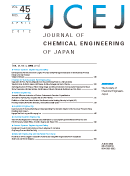
JOURNAL OF CHEMICAL ENGINEERING OF JAPAN
Pioneering Insights in the Heart of Chemical EngineeringJOURNAL OF CHEMICAL ENGINEERING OF JAPAN is a distinguished academic publication in the field of chemical engineering and chemistry, published by Taylor & Francis Ltd. With its ISSN 0021-9592 and E-ISSN 1881-1299, this journal has been a vital resource for researchers and practitioners since its inception in 1968 and continues to provide essential insights and advancements through 2024. The journal operates under an Open Access model as of 2023, promoting wider dissemination of research findings and encouraging collaboration within the global scientific community. Currently categorized in the Q4 quartile for both Chemical Engineering and Chemistry (miscellaneous) in 2023, it ranks within the lower percentiles of its respective fields, offering a platform for emerging scholars to publish their work and gain visibility. As part of Japan's academic landscape, it addresses numerous aspects of chemical engineering, fostering innovation and technical development that contribute to the industry's growth. Engaging with this journal is paramount for those looking to stay informed on the latest research trends and applications in chemical processes.
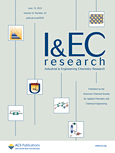
INDUSTRIAL & ENGINEERING CHEMISTRY RESEARCH
Innovating Solutions for Tomorrow's Industrial ChallengesINDUSTRIAL & ENGINEERING CHEMISTRY RESEARCH, published by the American Chemical Society, is a pivotal journal that disseminates high-quality research in the fields of Chemical Engineering, Chemistry, and Industrial and Manufacturing Engineering. With an impressive impact factor, this journal ranks in the top quartile (Q1) across multiple categories, reflecting its significance and influence within the scientific community. Since its inception in 1987, IECR has provided a platform for researchers, professionals, and students to publish innovative findings that advance the understanding and application of engineering chemistry. Though it operates under a subscription model, the journal continues to foster collaboration within the field, inviting contributions that span theoretical advancements, experimental studies, and practical applications. Whether you are engaged in academia or industry, IECR serves as a vital resource for staying abreast of the latest developments in chemical and engineering research.
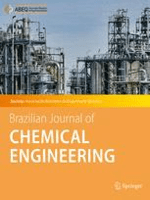
BRAZILIAN JOURNAL OF CHEMICAL ENGINEERING
Shaping the Future of Chemical Engineering, TogetherThe Brazilian Journal of Chemical Engineering (ISSN: 0104-6632, E-ISSN: 1678-4383), published by Springer Heidelberg, stands as a prominent open-access journal dedicated to disseminating innovative research and advancements in chemical engineering since its inception in 1997. With a commitment to enhancing knowledge exchange within the field, this journal is indexed in Scopus, earning a respectable Q3 rank in the category of General Chemical Engineering as of 2023. It provides a platform for researchers, professionals, and students to explore a diverse range of topics, fostering collaboration and innovation from its base in Brazil. The journal has converged its operations from 1995 and will continue to push the boundaries of chemical engineering research until 2024 and beyond. As a critical resource for up-to-date methodologies and emerging trends, the Brazilian Journal of Chemical Engineering is essential for those aiming to make impactful contributions in this dynamic and evolving field.